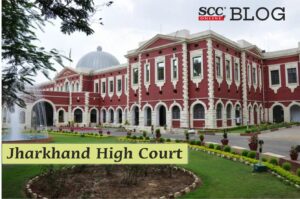Jharkhand High Court: Rajesh Shankar, J., while dismissing the present writ petition primarily for want of territorial jurisdiction held that even if a small part of cause of action is said to have arisen within the territorial jurisdiction of this Court, it would not be proper to entertain the petition applying the principle of forum conveniens.
This petition has been preferred by the petitioners for quashing and setting aside Certificate dated 30-12-2021 issued to the movie namely, “Holy Wound”, by Central Board of Film Certification (‘CBFC’), Kerala praying to stop the release of the said silent movie on OTT platform/ Youtube etc. or on any other social media platform as the movie is blasphemous in nature, hurting the religious sentiments of the petitioners and the Christian community at large.
Arguments:
Counsel for the petitioner claims that the movie’s trailer is available on a variety of social media sites, where it can be seen that the movie shows a sexual relationship between two female characters who have been in an emotional relationship since childhood and are eventually split when one of them joins a Catholic Church.
The counsel for the petitioner further submits that the film’s very disparaging content undoubtedly damages the Catholic Church’s reputation and that of its believers, which would demoralize those who entered the priestly orders and nunship. He contended that the CBFC should have followed the “Guidelines for Certification of Films for Public Exhibition” which provides that the objectives of film certification are to ensure that the medium of film remains responsible and sensitive to the values and standards of society. According to Clause-2(ix) of the said Guidelines, the CBFC must ensure that scenes degrading or denigrating women in any manner are not presented.
He further points out that soon after the trailer was released, the petitioner received several phone calls inquiring as to whether such things happened inside the convents which disturbed her mental disposition.
The counsel for petitioner put reliance on Kusum Ingots & Alloys Ltd. v. Union of India, (2004) 6 SCC 254 where it was held that the question as to whether the court has territorial jurisdiction to entertain a writ petition, must be arrived at on the basis of averments made in the petition, the truth or otherwise thereof being immaterial. It has further been held that in order to confer jurisdiction on a High Court to entertain a writ petition, it must be disclosed that the integral facts pleaded in support of the cause of action do constitute a cause so as to empower the court to decide the dispute and that the entire or a part of it arose within its jurisdiction. It has further been held that the place from where an appellate order or a revisional order is passed may give rise to a part of cause of action although the original order was passed at a place outside the said area. When a part of the cause of action arises within one or the other High Court, it will be for the petitioner to choose his forum.
ASGI appearing on behalf of the respondent (‘UoI’), at the outset, raises issues with regard to the maintainability of the present writ petition. It was argued that the head office of CBFC is situated in Mumbai and the impugned certificate has been issued by the regional office situated in Kerala. It was pointed out that even a small part of the cause of action has not arisen within the territorial jurisdiction of this Court and as such the present petition is liable to be dismissed without entering into the merit of the case for want of jurisdiction.
Issue:
Whether it would be proper to entertain the present writ petition applying the principle of forum conveniens?
Observation and Analysis:
The Court observed that the said concern shown by the petitioners appears to be omnibus in nature and there is every possibility that nuns residing in different parts of the country may have similar grievances as that of the petitioners. If the same issue is raised in different High Courts, there may be a possibility of divergent views coming up creating an impossible situation for the implementing agency to comply with all such orders.
The Court observed that in Kusum Ingots & Alloys Ltd. v. Union of India, (2004) 6 SCC 254, the Supreme Court has held that even if a small part of the cause of action arises within the territorial jurisdiction of a High Court, the same by itself may not be considered to be a determinative factor compelling the said High Court to decide the matter on merit. The court, in appropriate cases, may refuse to exercise its discretionary jurisdiction by invoking the doctrine of forum conveniens.
Thus, the Court held that it would not be proper to entertain the petition applying the principle of forum conveniens and dismissed the petition.
[Sithara Joy v. Union of India, 2022 SCC OnLine Jhar 716, decided on 30-03-2022]
Advocates who appeared in this case :
Mr. Shubhashis Rasik Soren, Advocate, for the Petitioner;
UoI: Mr. Prashant Pallav, ASGI, Advocate, for the Respondent;
State: Mr. Mohan Kumar Dubey, AC to AG, Advocate, for the Respondent.

